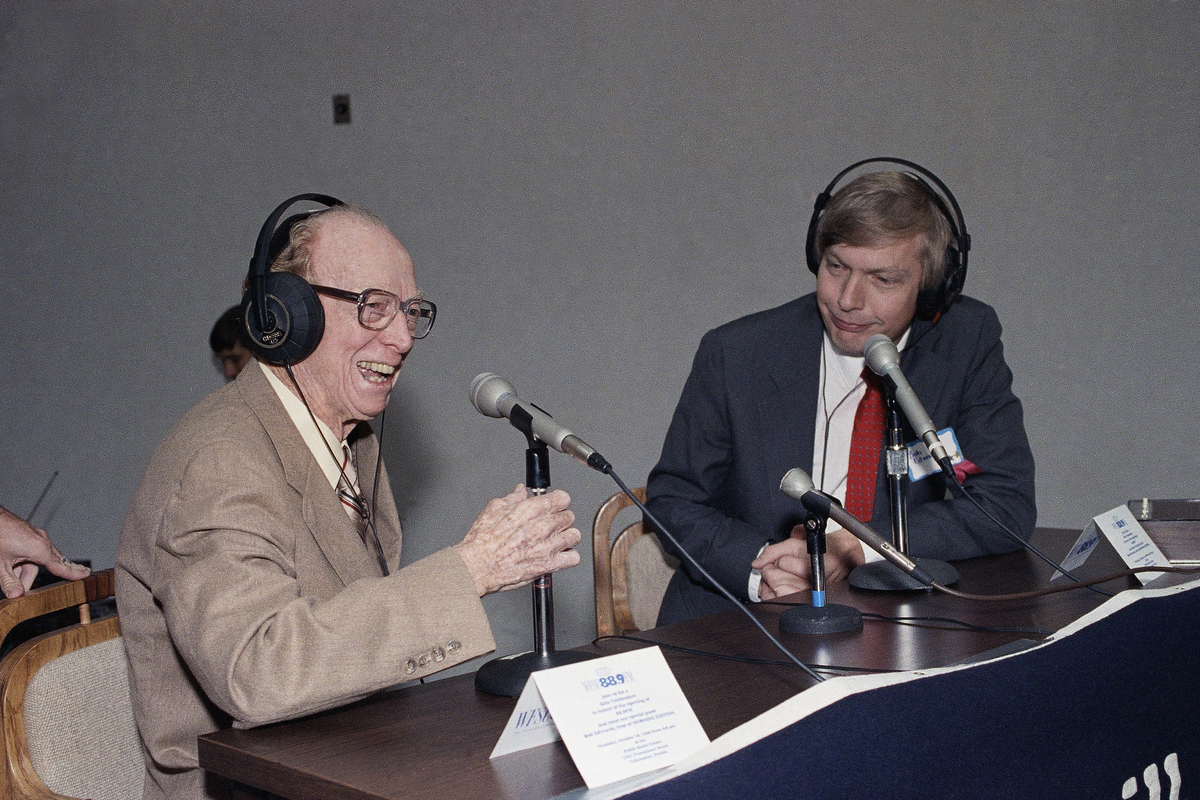
[ad_1]

Bob Edwards began his profession at NPR as a newscaster after which hosted All Things Considered earlier than transferring to Morning Edition. He’s pictured above in 1989.
Max Hirshfeld for NPR
disguise caption
toggle caption
Max Hirshfeld for NPR

Bob Edwards began his profession at NPR as a newscaster after which hosted All Things Considered earlier than transferring to Morning Edition. He’s pictured above in 1989.
Max Hirshfeld for NPR
Bob Edwards, the veteran broadcaster and longtime host of Morning Edition who left an indelible mark on NPR’s sound, has died. He was 76 years previous.
NPR’s Susan Stamberg says Edwards’ voice grew to become a part of the morning routine for thousands and thousands of Americans.
“He was Bob Edwards of Morning Edition for 24 1/2 years, and his was the voice we woke up to,” she says.
When listeners first heard that voice, they may have imagined a determine of nice authority, an avuncular newsman wearing a pinstripe go well with. But that was not Bob Edwards.
He was the consummate newsman
Margaret Low began on the firm in 1982 as a Morning Edition manufacturing assistant. Now CEO of WBUR in Boston, she served for 3 years as NPR’s senior vp for information. She says Edwards all the time walked within the door proper at 2:30 a.m., however he was informal.
“He was tall and lanky and wore jeans, and I think, if I remember right, was sort of pretty much always in an untucked flannel shirt.”
Low says Edwards’ seeming casualness belied a seriousness — about radio, in regards to the information and particularly in regards to the artwork of writing. Like a number of of his contemporaries at NPR, he studied writing at American University with former CBS journalist Ed Bliss.
“He used to say that Ed Bliss sat on his shoulder as he wrote,” Low remembers.
In truth, Edwards’ Washington, D.C., workplace neglected CBS News.
“I have this total image of Bob sitting in his office on M Street and it would be dark outside because it would be the middle of the night, and he faced the window over CBS News,” Low says. “And he would be typing on his manual typewriter with these really, really big keys, and they would go click, click, click, and behind him you would hear … the AP and Reuters wires.”
Edwards, Low says, was the consummate newsman.
“He was a total news guy, and I think understood the news deeply,” she says. “And in some ways he sort of set the bar for how we approach stories, because he would convey these stories with a kind of simplicity but also with real depth, and make sure that they somehow resonated. And that’s lasted.”
“As an NPR listener myself, I will always remember Bob Edwards’ deep warm baritone and the confident ease of his delivery. …” NPR President and CEO John Lansing says in an announcement. “Bob Edwards understood the intimate and distinctly personal connection with audiences that distinguishes audio journalism from other mediums, and for decades he was a trusted voice in the daily lives of millions of NPR listeners.”
‘Mr. Cool’ and Red Barber
Edwards began his profession at NPR as a newscaster after which hosted All Things Considered with Susan Stamberg. She says their types generally clashed.
“We had five good — if rocky — years together, until we sort of got one another’s rhythm, because he was Mr. Cool, he was Mr. Authoritative and straight ahead. I was the New Yorker with a million ideas and a big laugh. But we really adjusted rather well.”
Stamberg remembers Edwards for his humor, a top quality that was typically on show in his a whole lot of interviews with newsmakers, authors, musicians and singers.
One of Edwards’ longest-running radio relationships was additionally one among his listeners’ favorites: his weekly dialog with sports activities broadcasting legend Red Barber.

Sports broadcaster Red Barber with NPR’s Bob Edwards in 1992. Edwards talked to Barber each week on Morning Edition.
AP
disguise caption
toggle caption
AP

Sports broadcaster Red Barber with NPR’s Bob Edwards in 1992. Edwards talked to Barber each week on Morning Edition.
AP
Edwards finally wrote a ebook about his radio friendship with Barber, the primary of three he authored, together with a memoir, A Voice within the Box: My Life in Radio.
Edwards’ strategy helped set the tone for NPR
Edwards left NPR after the corporate determined to take away him as host of Morning Edition. Though his many followers protested mightily, Edwards closed out his final present on April 30, 2004. He ended his tenure simply because it began, by interviewing one among his radio heroes, Charles Osgood.
“You were the first person I interviewed for Morning Edition, and I wanted you to be the last,” Edwards instructed Osgood on air.
Edwards went on to host his personal interview present at Sirius XM Radio and continued to be heard on many public radio stations on Bob Edwards Weekend. But Margaret Low says his contribution to NPR won’t ever be forgotten.
“He sort of set the tone and the bar for all of us,” she says. “He understood the power and the intimacy of our medium and captured the attention of millions and millions of people who are still with us today.”
[adinserter block=”4″]
[ad_2]
Source link